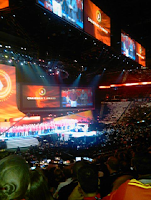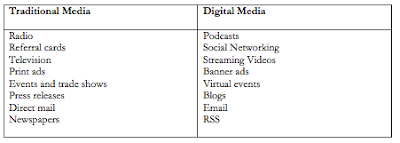 |
| Microsoft MGX event |
On the occasion of my 8th year of "BRAND INNOVATION," I'm
looking back at the key concepts that influenced my perspective on
power branding.
Quite possibly the
world's largest spender on event marketing, Microsoft became a marketing
juggernaut by transforming its event and trade show portfolio into a
turbocharged, experiential machine.
Local, regional, national
and global events are being mixed and matched into super-relevant engagement
platforms. The fusion of event delivery and digital technology has never been
more urgent. And live marketing is being measured more than ever before,
showing Microsoft what's working and why.
I had a chance to share time at a conference with Jeff Singsaas, general
manager of event marketing at Microsoft. He offered a taste of where the
event industry was headed, from the redeployment of dollars to portfolio
analysis to measurement and professional development.
Singsaas imparted this
5-part formula for winning events:
- A stable team of really good business people – to increase consistency of execution
- Making sure everyone is clear and accountable – to navigate account and budget
- Process focus – to remove variation and duplication
- Clear roles & responsibilities – to improve communication and accountability
- Great business acumen – to track budgets & metrics
From his vantage point at
Microsoft, Singsaas saw the trend toward digital events being added to the
marcom mix. This meant pairing tactics from the e-world to leverage traditional
media – all in the context of successful meeting promotions and management.
Given this trend, there
are four cornerstones of great marketing in this digital space:
- a clear value proposition of what the customer wants and needs.
- a more connected sales and marketing effort.
- a definable business strategy with goals and objectives for the events.
- storytelling that can make the message more compelling for customers.
Creating “the show that
never ends” also means designing digital event tactics that can build
anticipation, deepen the interaction, extend the experience, and magnify the
impact beyond the venue.
Building anticipation
means appealing to participants’ excitement and curiosity. Pre-meeting
communication can provide practical information that address concerns. In this
phase, one must avoid over-promising and under-delivering.
Deepening the impact
means creating more relevant and meaningful interactions with customers.
Planners should use technology as a means to this exchange, not simply having
some gadgets in the meeting.
Extending the experience
after the meeting can be accomplished in many ways using CDs, custom websites,
and downloadable photos.
Magnifying the impact of
an event helps leverage the investment in any convention, sales meeting, or
customer event. Examples are posting meeting content online, hosting a keynote
presentation in a virtual space, or even broadcasting live from an exhibit
booth with updates from the show. Blogging from breakout groups is another
common technique.
Rewriting the rule of
event marketing: Applications for power brand marketers
Your
event planning team can help you apply these best practices by connecting
traditional event tactics with digital tools.
I created this template to help list some of
the ways you could get more from you next event when you build anticipation,
deepen the interaction, extend the experience, and magnify the impact beyond
the venue.



No comments:
Post a Comment